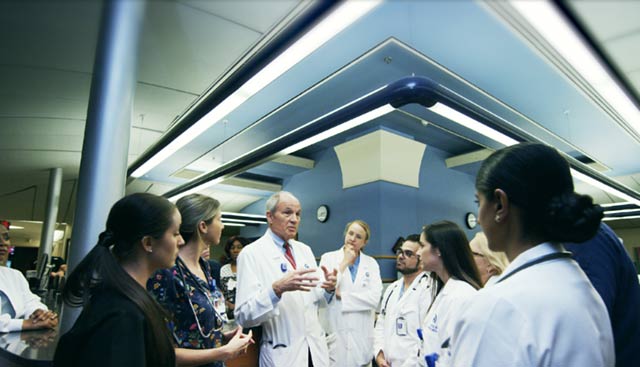Clinical Pathways

Clinical pathways are one of the ways that Moffitt Cancer Center works to provide the best possible treatment for each patient. By continually monitoring, measuring and reviewing the safety and clinical performance of various therapies, we are able to produce proven guidelines that our oncologists can use to make well-informed treatment decisions.
To date, we have designed clinical pathways for several dozen types of cancer, and we are continually researching pathways for additional diagnoses. These “best practice” guidelines help us ensure that each patient’s treatment is:
- Based on the most up-to-date scientific evidence
- Confirmed as the best possible option by a group of highly experienced specialists, including medical, surgical and radiation oncologists, pharmacists, dieticians, research professionals and others
- Optimized to be as cost-effective as possible (through the prescription of generic drugs rather than their name-brand counterparts, for instance)
Clinical pathways not only help to streamline the treatment planning process, but also provide opportunities for oncologists to consider specific factors that could impact a patient’s response to treatment. At Moffitt, we begin each plan by assessing the current best practices, then adjust our recommendations based on a patient’s unique needs. For instance, our oncologists evaluate the size, stage and location of a tumor – as well as its unique cellular makeup and a patient’s personal preferences – as we design each treatment plan.
To learn more about clinical pathways and how they might shape your treatment plan, request a consultation with one of Moffitt’s expert oncologists. Referrals are not required; call 1-888-663-3488 or submit a new patient registration form online to schedule a visit.
Treatments
- Blood Bone Marrow Transplant
- Bloodless Medicine and Surgery
- Cardio-Oncology
- Chemotherapy
- Clinical Pathways
- Clinical Trials
- Diagnostic Services
- Endoscopic Procedures
- Fertility Preservation
- Gynecologic Oncology
- Immunotherapy
- Interventional Pain Management
- Interventional Radiology
- Personalized Medicine
- Pharmacy
-
Radiation Therapy
- 3D CRT (Three-Dimensional Conformal Radiation Therapy)
- Adaptive Radiotherapy
- APBI (Accelerated Partial Breast Irradiation)
- Brachytherapy
- Common Questions
- CT-Driven Virtual Simulations
- External Radiotherapy
- IGRT (Image Guided Radiation Therapy)
- IMRT (Intensity Modulated Radiation Therapy)
- Internal Radiotherapy
- INTRABEAM® Intraoperative Radiotherapy
- Linear Accelerator (LINAC)
- MRI-Linac
- On-Board Imaging (OBI)
- Radiopharmaceuticals
- Respiratory Gating
- SBRT (Stereotactic Body Radiation Therapy)
- Stereotactic Radiosurgery
- Total Body Irradiation (TBI)
- Total Skin Electron Therapy (TSET)
- Volumetric Modulated Arc Therapy (VMAT)
- Rehabilitation Services
- Supportive Care Medicine
-
Surgical Care
- Cytoreductive Surgery and Hyperthermic Intraperitoneal Chemotherapy
- Intensive Care Unit
- Partial Hysterectomy for Gynecological Cancers
- Pleurodesis
- Radical Hysterectomy for Gynecological Cancers
- Reconstruction Surgery
- Robotic Surgery
- Scarless Surgery for Gynecological Cancers
- Total Hysterectomy for Gynecological Cancers
- Systemic Therapy
- Targeted Therapy
- Tumor Board
